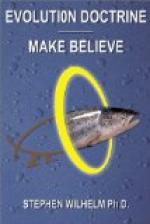But before passing to a detailed treatment of the analysis, synthesis, and genesis of religious systems, let us employ our common-sense for a brief backward glance over the known history of familiar facts. Every one is aware that the Christian religions of our time and community have not existed forever; this, indeed, is indicated by the way the passing years are denominated. We call the present year 1907 Anno Domini, and this whole expression explicitly refers to the fact that less than two thousand years ago the Christian systems of piety and worship collectively took their origin from their Hebrew ancestor. The same parent has produced the relatively unchanged Judaism of the present day. Judaism itself evolved under the influence of the Prophets, of Moses, and of Abraham. Turning to Asia, we learn how Buddhism evolved from Brahmanism. The teachings of Mohammed at a later time developed into the formulated precepts of the Koran. Would any one venture to assert that all or any of these systems of thought have stood firm and immutable from the finite or infinite beginnings of time? Would any one contend that the creeds of Protestantism have remained unchanged even during the past twenty years? Like all departments of human belief and knowledge, religious concepts have obviously altered in natural adjustment to changing times and to advancing conditions of human intellect; and the question turns to the mode by which they have been modified, to see whether natural causes of evolution have changed them, and have originated their earliest beginnings at the very outset of human history. It has been stated above that every race of mankind, however primitive or advanced it may be, holds some form of religious belief based upon some conception of the supernatural powers back of the world; and what the universe is conceived to be must largely determine the particular characteristics of a theology, and through this the special form of its attendant religion. We have before us a wide array of types to study and to compare, which vary so greatly, partly for the reason specified, that an inclusive definition of religion must be couched in very general terms.




